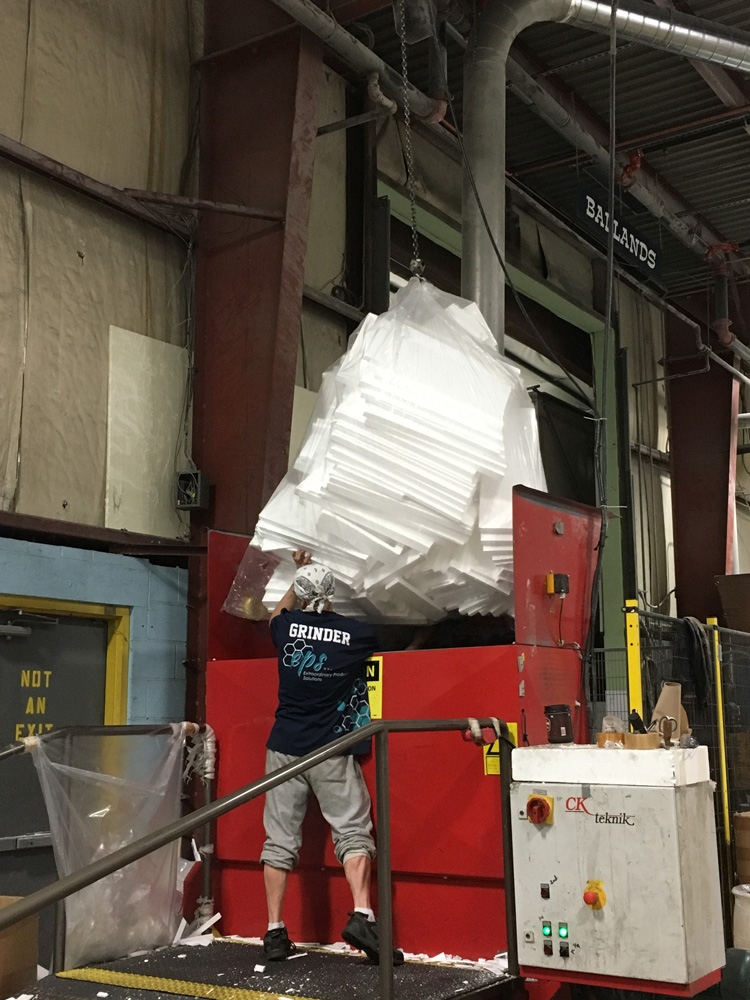This article was posted on April 21, 2017, by Insulation Corporation of America (ICA) – a Women-Owned manufacturer of Geofoam and Expanded Polystyrene (EPS), which is commonly but mistakenly referred to as Styrofoam™. ICA is located in Allentown, PA and services the entire Mid-Atlantic Region from Virginia to Maine to Ohio.
Recycling EPS is No Myth!
We all remember the fable of Chicken Little and “The sky is falling!”. Chicken Little truly believed the sky was falling and went on a journey convincing others of this ghastly news. There are many different versions of this fable that is centuries old, but the moral remains the same: Do not jump to conclusions and then spread them like they are facts until you have all the information or facts. Sadly today, when it comes to recycling expanded polystyrene (EPS), we have many “Chicken Littles” saying “You can’t recycle EPS.”
First things first. What exactly is EPS? EPS is expanded polystyrene foam. It is the white rigid foam that is commonly, but incorrectly referred to as Styrofoam. “Styrofoam” is a Dow trade-name, an extruded polystyrene, and it is actually blue in color. Why are there so many misconceptions about this versatile product? To start, both EPS and Styrofoam have different properties and uses. Unlike the blue foam (Styrofoam), the white foam (EPS) is indeed recyclable! The uses of EPS are virtually endless, ranging from insulation for coolers all the way to a soil substitute known as Geofoam. This recycled product has a variety of uses, from glue to park benches. In fact, not only is it recyclable, but there are also several different methods to do so. Take a look below.

The Grinder
At Insulation Company of America, our in-house method of recycling EPS is grinding and de-dusting. We back-haul EPS remnants from our customers to ICA in large clear bags. These remnants along with ICA’s scrap and excess trim are emptied into the grinder and then moves through a de-duster. The ground particles are then reincorporated into our manufacturing process to produce 1# density blocks. The ground product, or “re-grind”, is also sold to the horticulture industry to add to the soil of potted plants. The dust that is collected in this process is cubed and sold to vendors that make picture frames, park benches, trash cans and more. ICA also accepts clean EPS material from the public.
Densifying
Another way to recycle EPS is to densify the product into solid logs or blocks. The densifying process can take large volumes of EPS scrap and extrude it into a small volume. The end use for this product is similar to the dust blocks but also includes surfboards. According to BRASK Enterprises, a waste management service provider, the volume reduction is 50:1. FoamCycle, a recycling company, is on a mission to bring this type of equipment to municipalities, schools and businesses with small self-contained units that can be stored outdoors.

The Concentrator
Another recycling innovation is the Concentrator developed by Polystyvert. This is very exciting technology and a completely different approach to recycling EPS material. EPS foam is inserted into the Concentrator and mixed with a solvent. The solvent breaks down the EPS into a bead-like material with the properties of virgin polystyrene. This recycling solution also separates other materials from the EPS, such as films or other debris that can get mixed in with recycling.
These are all great methods of recycling and reusing EPS, keeping it out of our landfills. So why is it there are so many misconceptions about the use and recyclability of this versatile product? How do we stop the “Chicken Littles” who are trying to ban this product? Education and spreading the word is a start. Sadly, the perception of EPS has become a false reality, and the “Chicken Littles” are running around wanting to warn everyone about this terrible thing without a solid foundation of facts. As a reader of that old fable, of course it was so silly to think that the sky was falling, and why would anyone believe it? But that is no sillier than thinking EPS is not recyclable. That fable is no different than today’s fake news. The moral is the same. Know your facts, don’t jump to conclusions. We must be diligent in separating the truth from the myths. Here the fact is plain and simple: EPS is indeed recyclable.
Help us spread the word and educate consumers and businesses that EPS is recyclable by sharing on your social profiles!
Are you in the need of more information or recycling locations? Please visit Dart Container and EPS Industry Alliance to learn more.
• • • • • • • • • • • • • • • • • • • • • • • • • • • • • • • • • • • • • • • • • • • • • • • • • • • • • • • • • • • • • • • • • • • • • •